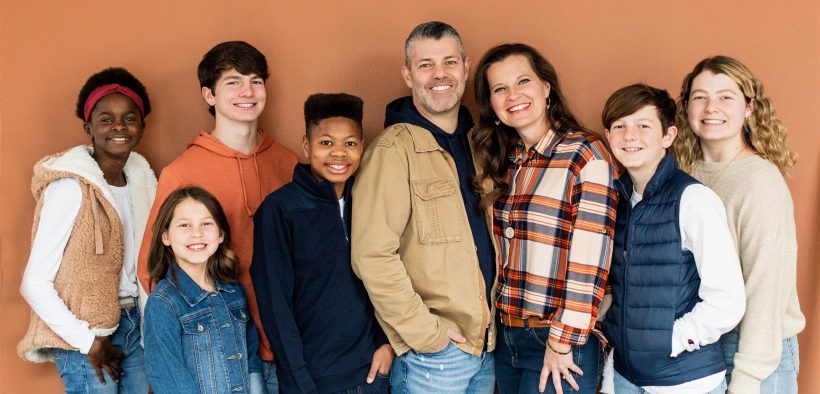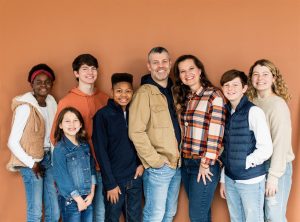Our Backyard Orphans
A Texas-based nonprofit equips churches to care for the 400,000 orphans in the United States one child at a time.

Eric Porter was a pastor for 12 years before he realized he had been bypassing the orphans in his own backyard to care for those in other countries.

“I was flying over kids to reach kids,” Porter said, speaking of his international missions trips. “There are kids in our own backyard who need us to speak up and sign up to help them.”
In the winter of 2011, Porter conducted research and found that out of the 140 million orphans worldwide there are 400,000 children who feel orphaned in the United States foster care system. This number includes more than 100,000 U.S. foster children waiting to be adopted.
Porter’s first awareness of foster children grew in his years as a youth pastor when he made necessary calls to a child abuse hotline. He started learning of children who had endured suffering such as being put in a dryer as discipline, being left in a dumpster as a newborn, and being beaten with canes for poor grades. Porter said bible college and seminary hadn’t equipped him to respond to these abusive situations or the massive nationwide need.
“This problem feels daunting,” Porter said. “How do we solve this? I felt like the church had a role in this, but I didn’t know what it was. The myth we have believed in America is that we have thought that orphan care is the government’s job. We turned a blind eye to what was happening down the street.”
In February 2011, Porter and his wife, Trisha, moved from intellectual awareness to personal conviction. The duo began the process of fostering to adopt a child. The same week they submitted their paperwork, Trisha “thought it would be fun to take a pregnancy test,” Porter said with a laugh. Expecting their fourth child, their personal adoption plan was thwarted for the time being — but the duo could not shake the calling.
“It was like God put a stick of dynamite in our hearts, and we could not stop thinking about it,” said Trisha during a video interview.
Believing their personal passion was now an occupational calling, Porter quit his job of 10 years as youth pastor of a church in Ozark, Mo., and relocated his family to the Dallas/Fort Worth area of Texas. Porter took a construction job while waiting five months to learn of their future in orphan care.
Access to MinistryWatch content is free. However, we hope you will support our work with your prayers and financial gifts. To make a donation, click here.
“There are all these orphans in the world and all these great foster care and adoption agencies. Then you have churches and families in those churches, but no one is connecting these entities to the church. God was saying I want you and Trish to connect the government and all the agencies to the church so that the church can get back her children,” Porter said during a video interview.
Backyard Orphans, an interdenominational nonprofit, was launched soon after. Since its 2012 beginnings, Backyard Orphans has placed almost 1,000 children in homes. Through their three main service venues — local church training, regional network training and the equipping of trainers — they have trained more than 100 churches.
From a team of two — Eric is the CEO and Trish is the program coordinator — to their current team of 15, Backyard Orphans’ main passion is to train individuals of all denominations to launch orphan ministries in their own churches.
Individuals like Crystal Liechty, who lives in Rockwall, Texas and quit her full-time job as a special education teacher eight years ago to train families to foster and adopt. Liechty and her husband fostered 12 children throughout the past 20 years. In addition to their biological son, the Liechty family adopted one foster daughter, now an 18-year-old.
“Orphan care is tough and it’s slow growth. But if I train 10 foster families a year, and they each take three kids, there is that ripple effect that goes around the neighborhood and through the public schools. I am not looking at numbers, I am looking at people,” Liechty said, adding that there are currently 31,000 children in the foster care system in Texas alone.
“It is not like taking on a small project and being done in a month. You have to be a really strong person to make a commitment to this — it takes ongoing energy. If you want to have a deep impact you have to pay a deep cost,” Liechty said.
Liechty debunked some of the myths of foster care she has come across. There are mainly two, she said. The first one is that as a foster parent you will get too attached, and it will hurt too bad when they leave. “To that I say, you are absolutely right! But these kids need unconditional love.”
The second is that “these kids are so troubled they will tear up your house and kill you in your sleep — not true!”
Liechty said that in her experience, while some of the foster children processing trauma need hospitalization and intervention, that’s rarely the case. “They will take energy, and we all have baggage but if we don’t believe there is hope and healing in Jesus, we are wasting our time.”
Five years into Backyard Orphans, the Porters said they started getting personally burdened again about opening up their own family to adoption.
“Not every church or family can foster [or] adopt, but we couldn’t shake it,” Porter said, adding that Memorial Day weekend of 2019, Robert and Kelsey entered their home for a permanent foster-to-adopt placement.
“The message of Backyard Orphans got a little deeper because of the intensity of taking in two pre-teens when we already had four biological kids. My advice is that these children in foster care need a home — but don’t do it unless God told you to do it. It isn’t for the weak of heart. But as for Kelsey and Robert — they fit right into our family!”
Porter encouraged those interested in fostering or adopting to contact their local child welfare office or a local agency. Church members or staff can consider contacting Backyard Orphans to collaborate on a customized solution for orphans in their area. Praying, giving financially, and meeting physical needs are other ways to step in and help, Porter said.
“We all need to care for the vulnerable. The widow, orphan, immigrant and the homeless — everyone is not called to foster or adopt, but we do believe everyone is called to do something,” Porter said.
Backyard Orphans is supported exclusively through donations, church support, and nonprofit fundraisers. Their training team raises individual funding. Thankfully, throughout the COVID-19 pandemic, Backyard Orphans’ donations did not lapse, Porter said, but he added that the pandemic continues to pose an orphan issue nationwide.
“There are less families ready to foster or adopt now than there have been in a long time because of the pandemic,” Porter said, adding that he is grateful for men like Pastor Jeff Leake of Allison Park Church of Pittsburg, Pa. “He knew the pandemic would only make foster care more challenging.”
In the face of that reality, Leake didn’t halt the plans to launch an orphan care ministry at Allison Park during 2020. Instead, Allison Park members were virtually trained by Backyard Orphans, and on their first Sunday back, September 27, 2020, they launched a brand new orphan care ministry they named Treasured Kids. That day, 35 families signed up to start the journey for foster care or adoption. In addition, church members joined the forces to pray for needs, spread the word, and provide for physical needs.
“Our vision is that we will see a day where there are more families waiting for children than children waiting for families,” Porter said.
Liechty spoke of the enormity of the orphan issue and then chuckled, reminiscing on an analogy Porter often uses. “Eric likes to say, ‘How do you eat an elephant? You eat it one bite at a time.’” She laughed. “With 400,000 kids in the foster care system I can get swallowed by the enormity of it. If everybody would just do their part in their little corner of the world, we would make a serious impact.”
For more information, go to www.backyardorphans.org and www.porterteam.org.



